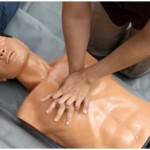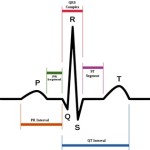Fast heart rhythm that starts in the lower part of the heart is exactly how we can explain the ventricular tachycardia. There are some cases where the ventricular tachycardia is left untreated. In this case some forms of the ventricular tachycardia may get worse and lead to ventricular fibrillation, which can be life-threatening. See a video on vtach
Ventricular tachycardia is a fast but regular rhythm. Because of the fast and irregular heart rhythm it can lead to ventricular fibrillation which is fast and irregular rhythm. With ventricular fibrillation, the heart beats are so fast and irregular that the heart stops pumping blood. When the heart stops pumping blood in this case we can say that ventricular fibrillation is a leading cause of sudden cardiac death.
 What can cause ventricular tachycardia?
What can cause ventricular tachycardia?
Sometimes the reasons for ventricular tachycardia are unknown, especially when the ventricular tachycardia occurs in young people. In most cases ventricular tachycardia is caused by heart disease, such as a previous heart attack, a congenital heart defect, hypertonic or dilated cardiomyopathy, or myocarditis. A ventricular tachycardia sometimes can occur after heart surgery.
Some of the medicines and that include the antiarrhythmic medicines, which are used to treat other types of abnormal heart rhythms, can cause ventricular tachycardia. In other cases that are less common causes can include blood imbalances, such as low potassium levels and other electrolyte imbalances.
Most people take nonprescription decongestants such as herbal remedies (especially those that contain ma huang or ephedra), diet pills, and “pep” pills often contain stimulants that can trigger episodes of ventricular tachycardia. The use of stimulants such as cocaine or other illegal drugs may cause ventricular tachycardia. Most important of all is to be aware of which substances have an effect on you and how to avoid them.
What are the symptoms of ventricular tachycardia?
In ventricular tachycardia the heart beats too rapidly, the ventricles cannot effectively pump oxygen-rich blood to the rest of the body. When it comes to ventricular tachycardia you should know that it can be life-threatening.
Some of the symptoms include:
- Palpitations- uncomfortable awareness of the heart beating rapidly or irregularly
- Dizziness, light-headiness
- Shortness of breath
- Chest pain, angina
- Near-fainting, syncope
- There is a weak pulse or no pulse
This kind of heart rhythm is dangerous for most people. If the rhythm lasts more than just a few seconds, it can turn into ventricular fibrillation which causes sudden death.
How the ventricular tachycardia can be diagnosed?
If an electrocardiogram is performed while ventricular tachycardia is occurring, if can perform the most useful information. The electrocardiogram traces the electrical activity of your heart. An electrocardiogram is usually done along with a history and physical examination, lab tests and a chest X-ray.
Sometimes ventricular tachycardia can occur intermittently and may not always be captured by an EKG at the doctor’s office, you may be asked to use a portable EKG to record your heart rhythm on a continuous basis. This continuous basis can mean that you may have to use this EKG over 24-hour period. It is referred to by several names, including ambulatory electrocardiography, ambulatory EKG, Holter monitoring, 24-hour EKG, or cardiac event monitoring.
Treatment for ventricular tachycardia
The treatment of ventricular tachycardia depends on the symptoms as well of the type of the heart disorder. Some of the patients may not need treatment.
If there is an emergency situation, it may require:
- CPR
- Electric shock
- Anti-arrhythmic medications (lidocain, procainamide, sotalol or amiodarone) given through a vein
A long-term treatment of ventricular tachycardia may require use if oral anti-arrhythmic medications such as procainamide, amidorane or sotalol. These anti-arrhythmic medications may have severe side effects. The use of these medications is decreasing in favor of other treatments.
Not all ventricular tachycardias are treated with an ablation procedure. The radiofrequency catheter ablation is used for therapy and it can cure certain tachycardias. The therapy for many chronic ventricular tachycardias is implanting a device called implantable cardioverter defibrillator (ICD). This cardioverter defibrillator is implanted in the chest of the patient and is more like a pacemaker. The ICD is connected to the heart with wires.
The doctor programs the ICD to sense when ventricular tachycardia is occurring, and to administer a shock to stop it. This device can be also programmed to send a rapid burst of paced beats to interrupt the ventricular tachycardia. If






















